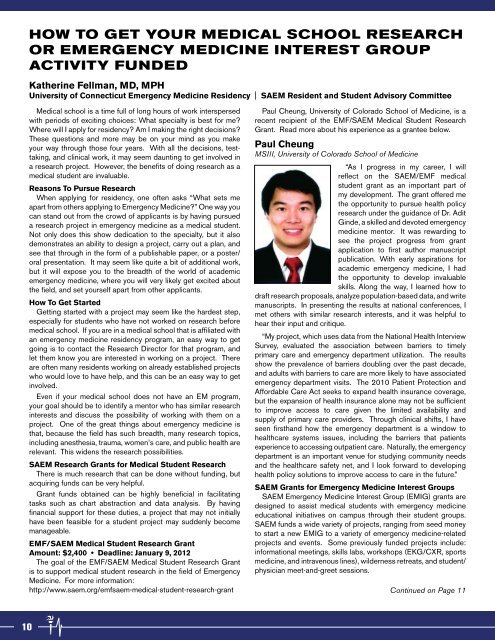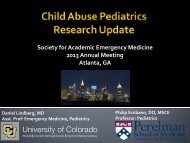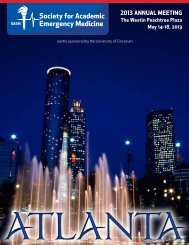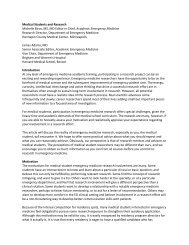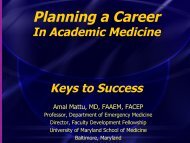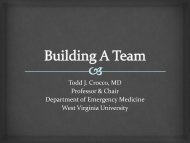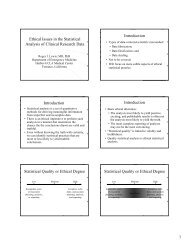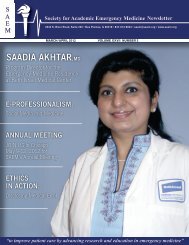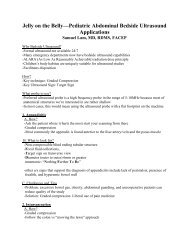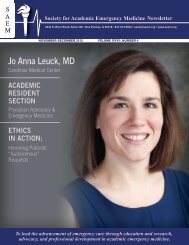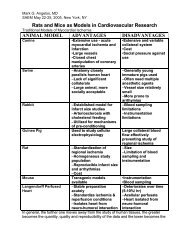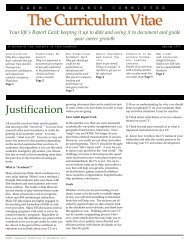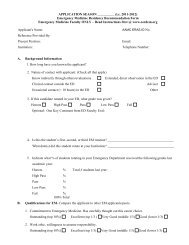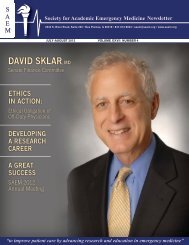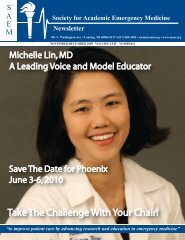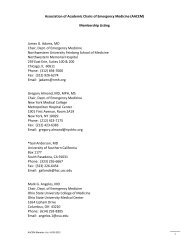Nov-Dec 2011 Newsletter.pdf - The Society for Academic ...
Nov-Dec 2011 Newsletter.pdf - The Society for Academic ...
Nov-Dec 2011 Newsletter.pdf - The Society for Academic ...
You also want an ePaper? Increase the reach of your titles
YUMPU automatically turns print PDFs into web optimized ePapers that Google loves.
How To Get Your Medical School Research<br />
or Emergency Medicine Interest Group<br />
Activity Funded<br />
Katherine Fellman, MD, MPH<br />
University of Connecticut Emergency Medicine Residency | SAEM Resident and Student Advisory Committee<br />
Medical school is a time full of long hours of work interspersed<br />
with periods of exciting choices: What specialty is best <strong>for</strong> me?<br />
Where will I apply <strong>for</strong> residency? Am I making the right decisions?<br />
<strong>The</strong>se questions and more may be on your mind as you make<br />
your way through those four years. With all the decisions, testtaking,<br />
and clinical work, it may seem daunting to get involved in<br />
a research project. However, the benefits of doing research as a<br />
medical student are invaluable.<br />
Reasons To Pursue Research<br />
When applying <strong>for</strong> residency, one often asks “What sets me<br />
apart from others applying to Emergency Medicine?” One way you<br />
can stand out from the crowd of applicants is by having pursued<br />
a research project in emergency medicine as a medical student.<br />
Not only does this show dedication to the specialty, but it also<br />
demonstrates an ability to design a project, carry out a plan, and<br />
see that through in the <strong>for</strong>m of a publishable paper, or a poster/<br />
oral presentation. It may seem like quite a bit of additional work,<br />
but it will expose you to the breadth of the world of academic<br />
emergency medicine, where you will very likely get excited about<br />
the field, and set yourself apart from other applicants.<br />
How To Get Started<br />
Getting started with a project may seem like the hardest step,<br />
especially <strong>for</strong> students who have not worked on research be<strong>for</strong>e<br />
medical school. If you are in a medical school that is affiliated with<br />
an emergency medicine residency program, an easy way to get<br />
going is to contact the Research Director <strong>for</strong> that program, and<br />
let them know you are interested in working on a project. <strong>The</strong>re<br />
are often many residents working on already established projects<br />
who would love to have help, and this can be an easy way to get<br />
involved.<br />
Even if your medical school does not have an EM program,<br />
your goal should be to identify a mentor who has similar research<br />
interests and discuss the possibility of working with them on a<br />
project. One of the great things about emergency medicine is<br />
that, because the field has such breadth, many research topics,<br />
including anesthesia, trauma, women’s care, and public health are<br />
relevant. This widens the research possibilities.<br />
SAEM Research Grants <strong>for</strong> Medical Student Research<br />
<strong>The</strong>re is much research that can be done without funding, but<br />
acquiring funds can be very helpful.<br />
Grant funds obtained can be highly beneficial in facilitating<br />
tasks such as chart abstraction and data analysis. By having<br />
financial support <strong>for</strong> these duties, a project that may not initially<br />
have been feasible <strong>for</strong> a student project may suddenly become<br />
manageable.<br />
EMF/SAEM Medical Student Research Grant<br />
Amount: $2,400 • Deadline: January 9, 2012<br />
<strong>The</strong> goal of the EMF/SAEM Medical Student Research Grant<br />
is to support medical student research in the field of Emergency<br />
Medicine. For more in<strong>for</strong>mation:<br />
http://www.saem.org/emfsaem-medical-student-research-grant<br />
Paul Cheung, University of Colorado School of Medicine, is a<br />
recent recipient of the EMF/SAEM Medical Student Research<br />
Grant. Read more about his experience as a grantee below.<br />
Paul Cheung<br />
MSIII, University of Colorado School of Medicine<br />
“As I progress in my career, I will<br />
reflect on the SAEM/EMF medical<br />
student grant as an important part of<br />
my development. <strong>The</strong> grant offered me<br />
the opportunity to pursue health policy<br />
research under the guidance of Dr. Adit<br />
Ginde, a skilled and devoted emergency<br />
medicine mentor. It was rewarding to<br />
see the project progress from grant<br />
application to first author manuscript<br />
publication. With early aspirations <strong>for</strong><br />
academic emergency medicine, I had<br />
the opportunity to develop invaluable<br />
skills. Along the way, I learned how to<br />
draft research proposals, analyze population-based data, and write<br />
manuscripts. In presenting the results at national conferences, I<br />
met others with similar research interests, and it was helpful to<br />
hear their input and critique.<br />
“My project, which uses data from the National Health Interview<br />
Survey, evaluated the association between barriers to timely<br />
primary care and emergency department utilization. <strong>The</strong> results<br />
show the prevalence of barriers doubling over the past decade,<br />
and adults with barriers to care are more likely to have associated<br />
emergency department visits. <strong>The</strong> 2010 Patient Protection and<br />
Af<strong>for</strong>dable Care Act seeks to expand health insurance coverage,<br />
but the expansion of health insurance alone may not be sufficient<br />
to improve access to care given the limited availability and<br />
supply of primary care providers. Through clinical shifts, I have<br />
seen firsthand how the emergency department is a window to<br />
healthcare systems issues, including the barriers that patients<br />
experience to accessing outpatient care. Naturally, the emergency<br />
department is an important venue <strong>for</strong> studying community needs<br />
and the healthcare safety net, and I look <strong>for</strong>ward to developing<br />
health policy solutions to improve access to care in the future.”<br />
SAEM Grants <strong>for</strong> Emergency Medicine Interest Groups<br />
SAEM Emergency Medicine Interest Group (EMIG) grants are<br />
designed to assist medical students with emergency medicine<br />
educational initiatives on campus through their student groups.<br />
SAEM funds a wide variety of projects, ranging from seed money<br />
to start a new EMIG to a variety of emergency medicine-related<br />
projects and events. Some previously funded projects include:<br />
in<strong>for</strong>mational meetings, skills labs, workshops (EKG/CXR, sports<br />
medicine, and intravenous lines), wilderness retreats, and student/<br />
physician meet-and-greet sessions.<br />
Continued on Page 11<br />
10


